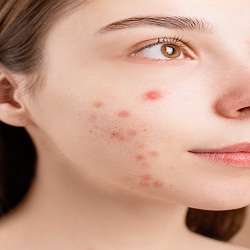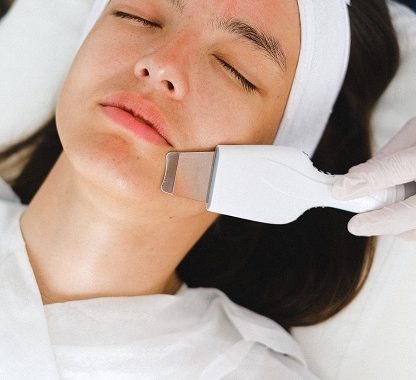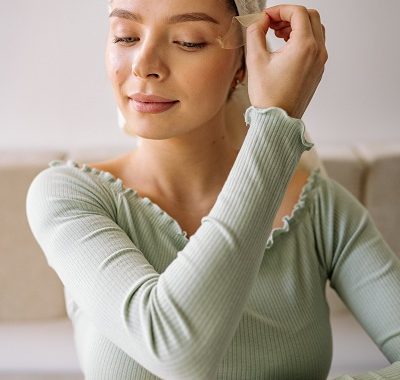
-
Keep Your Skin Clean: The Foundation of Acne Care
Consistently maintaining clean skin is crucial for effective acne care. Dermatologists recommend washing your face up to twice daily and after sweating to remove excess oil, dirt, and bacteria that can clog pores and cause breakouts.
Use a gentle, non-abrasive cleanser to avoid irritating the skin. Harsh cleansers and scrubbing can exacerbate acne by causing redness and inflammation.
When applying the cleanser, use your fingertips instead of washcloths or sponges, which can be too rough and may introduce additional bacteria.
Proper cleansing helps keep the skin’s natural barrier intact, promoting a healthier complexion and reducing the likelihood of new acne lesions. Regular and careful cleaning forms the foundation of a successful acne care regimen, preventing the buildup of impurities that lead to breakouts.
-
Choose the Right Skin Care Products: Gentle is Key
When choosing skin care products, prioritize those labeled “alcohol-free” to avoid common irritants.
Alcohol can strip your skin of essential moisture, leading to dryness and irritation.
Avoid astringents, toners, and exfoliants, as these products often contain harsh chemicals that can dry out your skin, worsening acne and leading to increased oil production as your skin tries to compensate for the lost moisture.
Opt for gentle cleansers and moisturizers formulated for sensitive skin. Look for ingredients like hyaluronic acid, glycerin, and ceramides, which hydrate and strengthen the skin barrier without causing irritation.
Non-comedogenic products are also ideal, as they won’t clog pores, reducing the risk of breakouts. Always patch-test new products to ensure they don’t cause adverse reactions. Prioritizing gentle, hydrating, and non-irritating products can help maintain a healthy, clear complexion.
Best acne scar removal products
-
Shampoo Regularly: Addressing Forehead Acne
Hair oil can exacerbate acne on the forehead by transferring excess sebum and dirt onto the skin.
If you have oily hair, it is crucial to increase the frequency of your shampooing routine to manage oil production effectively. Regularly washing your hair can help remove the buildup of oils and impurities that might clog pores and cause breakouts.
Additionally, keeping your hair away from your face, such as by tying it back or using hair accessories, can minimize contact with the skin and reduce the risk of acne.
Choosing a gentle, oil-free shampoo can also help in maintaining a balanced scalp and forehead. Implementing these practices consistently can significantly contribute to clearer skin and reduce the incidence of forehead acne.
-
Stick to Your Treatment: Patience is Key
Consistency is crucial in acne treatment. Switching products or methods too frequently can irritate your skin and worsen breakouts. It’s important to adhere to your chosen regimen without making impulsive changes.
Acne treatments often require time to show results, typically taking several weeks to a few months. Trust the process and resist the urge to seek quick fixes, as these can lead to setbacks.
Regularly follow your dermatologist’s advice, maintain a steady routine, and monitor your skin’s progress. Keeping a skincare journal can help track improvements and identify any triggers.
Remember, persistence and patience are essential for effective acne management and achieving clear, healthy skin.
The Complete Acne Health and Diet Guide
�
Read more:
The Best Fruits for Acne-Free Skin
What should be your daily routine for acne?
What is a good skin care routine for acne
The Ultimate Acne Prevention Diet
How To Cure Acne Naturally In 3 Days?
-
Keep Your Hands Off: Resist the Temptation
Touching your face frequently can worsen acne by transferring oils, bacteria, and dirt from your hands to your skin. Picking or squeezing pimples can be especially harmful. It can push bacteria deeper into the skin, causing more inflammation and potential infections.
This behavior not only delays the healing process but also significantly increases the risk of permanent scarring and post-inflammatory hyperpigmentation, which are dark spots left behind after acne heals.
Moreover, these habits can lead to more severe skin issues, including cystic acne, which is more challenging to treat.
Therefore, it is crucial to resist the temptation to touch your face or pick at blemishes to promote faster and cleaner healing. Using clean hands when necessary, such as during skincare routines, is important to avoid exacerbating skin issues.
-
Sun Protection: Guard Against UV Damage
Sun exposure can aggravate acne, especially when using medications like retinoids or antibiotics, which increase skin sensitivity to UV rays.
To prevent this, avoid tanning beds and prolonged sun exposure. Use a broad-spectrum sunscreen with an SPF of 30 or higher to shield your skin from harmful UV radiation.
Opt for non-comedogenic sunscreens to prevent pore blockage and avoid exacerbating acne. Additionally, wearing sun-protective clothing with a UPF (Ultraviolet Protection Factor) rating provides extra defense against UV rays.
This clothing is designed to block out a significant amount of UV radiation, offering a physical barrier that complements the use of sunscreen. Combining these measures helps protect your skin from sun damage and reduces the risk of acne flare-ups caused by UV exposure.
�
Conclusion: Patience and Professional Guidance
Remember, acne takes time to clear, and consistency is key. If breakouts persist, seek the expertise of a board-certified dermatologist. Dermatologists can tailor treatments to your specific needs, addressing existing acne, preventing new breakouts, and minimizing the risk of scarring.
By incorporating these habits and consulting with a professional, you can embark on a journey toward clearer, healthier skin.
Further Reading:
Want to Get Clear Skin? Try These 11 Evidence-Backed Tips
FAQs:
What are the habits against acne?
Effective habits against acne include maintaining a consistent and gentle cleansing routine with a non-abrasive cleanser, choosing skin care products labeled “alcohol-free” to avoid irritation, and regular shampooing to address forehead acne caused by hair oil. Patience is crucial—stick to your chosen acne treatment, avoiding frequent changes.
Refrain from touching your face to prevent flare-ups, and prioritize sun protection with a broad-spectrum, non-comedogenic sunscreen of SPF 30 or higher. Seeking professional advice from a board-certified dermatologist ensures personalized care for treating existing acne and preventing future breakouts.
What habits help clear skin?
To achieve clear skin, adopt habits such as consistent and gentle cleansing, using alcohol-free and non-irritating skin care products, regular shampooing to prevent forehead acne, and sticking to a consistent acne treatment without frequent changes.
Avoid touching your face to minimize breakouts and prioritize sun protection with a broad-spectrum, non-comedogenic sunscreen. Seeking professional guidance from a dermatologist can provide personalized strategies for clearing the skin and maintaining a healthy complexion.
What is a good skin care routine for acne?
A good skin care routine for acne involves gentle cleansing with a mild, non-abrasive cleanser twice daily. Choose alcohol-free and non-irritating skin care products, avoiding astringents and exfoliants that may worsen acne. Use a targeted acne treatment consistently, allowing time for results.
Regular shampooing helps prevent forehead acne, and refraining from touching your face reduces the risk of flare-ups. Prioritize sun protection with a non-comedogenic sunscreen. Consulting with a dermatologist can customize an effective and personalized skin care plan for managing acne.
What are 6 ways to treat acne?
- Topical Treatments: Over-the-counter or prescription creams and gels containing ingredients like benzoyl peroxide, salicylic acid, or retinoids can target acne by unclogging pores, reducing inflammation, and promoting skin cell turnover.
- Oral Medications: Antibiotics, oral contraceptives (for females), and isotretinoin are prescription options that address acne from within, targeting bacteria, hormonal imbalances, and excessive oil production.
- Professional Procedures: Dermatological procedures like chemical peels, microdermabrasion, and laser therapy can help manage acne by exfoliating the skin, reducing oil production, and promoting collagen production.
- Light Therapy: LED or laser light therapy can kill acne-causing bacteria, reduce inflammation, and promote healing. It is often used as a complementary treatment for various forms of acne.
- Hormonal Therapies: For individuals with hormonal imbalances contributing to acne, hormonal therapies like oral contraceptives, anti-androgen medications, or other hormonal regulators may be recommended.
- Lifestyle Changes: Adopting a healthy lifestyle, including a balanced diet, regular exercise, stress management, and adequate sleep, can contribute to overall skin health and help manage acne.



Pingback: How To Cure Acne Naturally In 3 Days? - Acnes derma relief
Pingback: The Ultimate Acne Prevention Diet - Acnes derma relief
Pingback: What is a good skin care routine for acne - Acnes derma relief
Pingback: What keeps skin clear of acne - Acnes derma relief
Pingback: What should be your daily routine for acne? - Acnes derma relief
Pingback: What Habits Help Clear Skin - Acnes derma relief
Pingback: The Best Fruits for Acne-Free Skin - Acnes derma relief